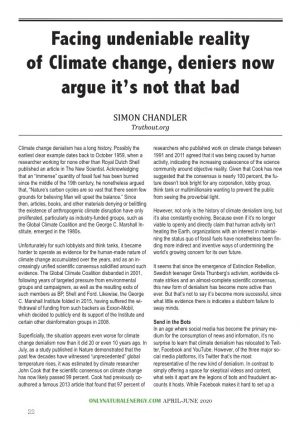 Climate change denialism has a long history. Possibly the earliest clear example dates back to October 1959, when a researcher working for none other than Royal Dutch Shell published an article in The New Scientist. Acknowledging that an “immense” quantity of fossil fuel has been burned since the middle of the 19th century, he nonetheless argued that, “Nature’s carbon cycles are so vast that there seem few grounds for believing Man will upset the balance.” Since then, articles, books, and other materials denying or belittling the existence of anthropogenic climate disruption have only proliferated, particularly as industry-funded groups, such as the Global Climate Coalition and the George C. Marshall Institute, emerged in the 1980s.
Climate change denialism has a long history. Possibly the earliest clear example dates back to October 1959, when a researcher working for none other than Royal Dutch Shell published an article in The New Scientist. Acknowledging that an “immense” quantity of fossil fuel has been burned since the middle of the 19th century, he nonetheless argued that, “Nature’s carbon cycles are so vast that there seem few grounds for believing Man will upset the balance.” Since then, articles, books, and other materials denying or belittling the existence of anthropogenic climate disruption have only proliferated, particularly as industry-funded groups, such as the Global Climate Coalition and the George C. Marshall Institute, emerged in the 1980s.
Unfortunately for such lobbyists and think tanks, it became harder to operate as evidence for the human-made nature of climate change accumulated over the years, and as an increasingly unified scientific consensus solidified around such evidence. The Global Climate Coalition disbanded in 2001, following years of targeted pressure from environmental groups and campaigners, as well as the resulting exits of such members as BP, Shell and Ford. Likewise, the George C. Marshall Institute folded in 2015, having suffered the withdrawal of funding from such backers as Exxon-Mobil, which decided to publicly end its support of the Institute and certain other disinformation groups in 2008.
Superficially, the situation appears even worse for climate change denialism now than it did 20 or even 10 years ago. In July, as a study published in Nature demonstrated that the past few decades have witnessed “unprecedented” global temperature rises, it was estimated by climate researcher John Cook that the scientific consensus on climate change has now likely passed 99 percent. Cook had previously co-authored a famous 2013 article that found that 97 percent of researchers who published work on climate change between 1991 and 2011 agreed that it was being caused by human activity, indicating the increasing coalescence of the science community around objective reality. Given that Cook has now suggested that the consensus is nearly 100 percent, the future doesn’t look bright for any corporation, lobby group, think tank or multimillionaire wanting to prevent the public from seeing the proverbial light.
However, not only is the history of climate denialism long, but it’s also constantly evolving. Because even if it’s no longer viable to openly and directly claim that human activity isn’t heating the Earth, organizations with an interest in maintaining the status quo of fossil fuels have nonetheless been finding more indirect and inventive ways of undermining the world’s growing concern for its own future.
It seems that since the emergence of Extinction Rebellion, Swedish teenager Greta Thunberg’s activism, worldwide climate strikes and an almost-complete scientific consensus, this new form of denialism has become more active than ever. But that’s not to say it’s become more successful, since what little evidence there is indicates a stubborn failure to sway minds.
Send in the Bots
In an age where social media has become the primary medium for the consumption of news and information, it’s no surprise to learn that climate denialism has relocated to Twitter, Facebook and YouTube. However, of the three major social media platforms, it’s Twitter that’s the most representative of the new kind of denialism. In contrast to simply offering a space for skeptical videos and content, what sets it apart are the legions of bots and fraudulent accounts it hosts. While Facebook makes it hard to set up a fake user account, Twitter has facilitated the existence of thousands (if not millions) of automated or astroturfed accounts — which in this case, deviously create the illusion of widespread support for the idea that anthropogenic climate change is either a lie or bad science.
In an age where social media has become the primary medium for news and information, it’s no surprise that climate denialism has relocated to Twitter, Facebook and YouTube.
In a study published in November 2018, researchers at Brown University found that bots were generating 20 percent of all posts on Twitter related to climate change. They examined a sample of 144,000 accounts discussing climate change on the platform, finding that about 23,000 of these were bots, and while this is already a high number, it’s likely that bot activity has increased in more recent months, as a kind of reactionary counterattack against the growing momentum behind climate activism.
On the one hand, this has been the impression of climate scientists and activists operating on Twitter. Replying to a tweet of a user who’d complained about climate deniers “crawling out from everywhere today,” renowned climatologist Michael E. Mann wrote in August that, “A lot of them are bots and paid trolls. It’s the preferred method of warfare by the climate change denial/delay machine.” Similarly, one active Twitter climate campaigner advised his followers to “be on the lookout for these new, low-follower accounts. There’s been a BIG uptick in them in mid-2019.”
It would of course be rash to place too much faith in these subjective impressions of increased activity, but there have also been more objective measures of surges, which tend to arise whenever the issue of climate change gains more airtime and acceptance. In early September, “climate change” became the most popular term being used by the 100,000 accounts tracked by Bot Sentinel, a tool which monitors suspect and automated Twitter users. It rose in visibility after CNN’s Climate Crisis Town Hall on September 4, appearing in 700 separate mentions within the following 24-hour period.
It’s hard to determine just who or what exactly is responsible for such spikes in activity. However, in speaking with InsideClimate News (which originally broke the story above), climate scientist Mann suggested that the usual suspects are likely pulling the strings of the new legions of climate-denying bots, just as they were with the lobby groups and think tanks of yore. “I believe this is a concerted effort, likely by bad state actors and fossil fuel interests, to create disinformation, discord and division as we approach the all-important UN Summit and children’s youth event later this month,” he said.
Energy companies have in the recent past harnessed bots and fake accounts to manufacture the veneer of public acceptance of their industry.
Mann provided no evidence for these specific claims, but there is at least an indication that energy companies have in the recent past harnessed bots and fake accounts to manufacture the veneer of public acceptance of their industry. In 2016, DeSmogBlog published an investigative report that concluded that the Midwest Alliance for Infrastructure Now (MAIN) had created at least 16 suspicious Twitter accounts to propagate a pro-Dakota Access Pipeline message. MAIN’s members include, among others, the North Dakota Petroleum Council, Petroleum Marketers, and the South Dakota Petroleum and Propane Marketers Association, the latter of which currently counts ExxonMobil as an “energy associate.”
The fact that such organizations likely involved themselves in manipulating online political discourse in the case of the Dakota Access Pipeline implies that similar groups may very well be involved in the current wave of online climate denialism. Because without any massively public leak and backlash, why stop with only one episode?
Undermining Rather Than Denying
But it isn’t only the migration to social media and the simulation of public backing that characterizes modern climate denialism. Its other defining feature is that, rather than directly rejecting the thesis of human-made climate change, contemporary climate denialism has been increasingly fashioning indirect and tangential ways of undermining calls for significant action on renewables and carbon reduction. Often, these new “indirect” methods amount to little more than nitpicking with how the issue of climate change is being described or presented, or at best, calling into question the political motives of those advocating for action and reform.
As an example, both of these tendencies were on display in an article published by National Review on September 6, only two days after CNN’s Climate Crisis Town Hall television special. Written by Jonah Goldberg of the American Enterprise Institute, it set its sights on disputing whether climate change really constitutes an existential threat, rather than merely a threat to our quality of life, while also criticizing certain Democrats for referring to it as an existential crisis. At the same time, it proffered the argument that Democrats (and likely other climate activists) don’t really care about the issue, and instead “want to use it as an excuse to radically transform the American economy and political system along lines that have less to do with climate change and much to do with their ideological animosity to the status quo.”
Data from Google Trends reveal that search phrases such as “global warming hoax” and “climate change hoax” aren’t as popular as they were a couple of years ago. It’s interesting to raise the specter of funding here. According to SourceWatch and the investigative news site Sludge, National Review has received numerous donations over the past few years from the Charles Koch Foundation and the Lynde and Harry Bradley Foundation, both of which are highly active in supporting climate change skepticism. At the same time, it’s worth noting that the American Enterprise Institute — of which author Goldberg holds the “Asness Chair in Applied Liberty” — has also been funded by the Lynde and Harry Bradley Foundation, with leaked documents revealing that the Institute received nearly $2.5 million from the Foundation between 2011 and 2015 alone.
In other words, Goldberg’s National Review article has the full weight of the fossil fuel lobby behind it, as do similar articles on climate change published in The American Spectator and The Daily Caller, to name two others. Yet aside from the weaponizing of pedantry and the practice of attacking the political motives of reformers, the anti-green lobby has also adopted an even more novel, albeit occasionally more absurd, method.
As witnessed by a ludicrous article published last year by Spiked, this additional tactic entails the argument that rising global temperatures won’t actually be as bad as our best science indicates they’ll be. In this article, author Rob Lyons responds to a recent paper published in PLOS One in which it’s calculated that, in 2050, London’s climate will be comparable to that of Barcelona today. “Given that most Brits spend all year saving up to have a week or two in the sun on the beaches in places like Barcelona,” Lyons opines, “this is hardly the end of the world. In fact, it sounds great. It is a change that we will have to adapt to, of course, but it is surely something that we can cope with.”
Once again, it’s worth pointing out that Spiked has been funded by the Charles Koch Foundation. Likewise, other articles running with the “it-won’t-be-so-bad” theme have also been published in such places as National Affairs and Reason, which have also received significant financial support from the Lynde and Harry Bradley Foundation, in the case of National Affairs, as well as the Koch Foundation and the Scaife Foundation, in the case of Reason.
Put simply, despite the fact that the fossil fuel lobby has withdrawn from the increasingly difficult challenge of claiming that climate change isn’t anthropogenic, it’s nevertheless as active and as insidious as it has ever been. Its tactics have changed to become more duplicitous, more indirect, more tendentiously pedantic and more ad hominem (witness the regular personal attacks on climate activist Thunberg and Rep. Alexandria Ocasio-Cortez), and it’s this change in approach that has enabled it to ramp up its denialism in recent months and years.
Declining Popularity
The question is, are the new methods of the denialism lobby effective? This is a tricky question to answer, because while the global political momentum appears to be moving in favor of those who want action on climate change, the keys to the White House — and to the Environmental Protection Agency — belong to people who either don’t believe in anthropogenic climate disruption, or who simply want to find excuses not to act.
Still, in terms of shaping public opinion, it would appear that the new denialism hasn’t been particularly successful. Data from Google Trends, for instance, reveal that search phrases such as “global warming hoax” and “climate change hoax” aren’t as popular as they were a couple of years ago.
In 2017, the average popularity of “global warming hoax” as a search phrase in the U.S. was 26.9 (100 represents the peak popularity for a term). In 2019, the average for the same phrase was only 12.5, indicating that fewer people are now searching for evidence of a hoax than they were two years ago (in 2015, the average was 28.9, while in 2016 it was 27.7). Similarly, the average popularity of “climate change hoax” was 13.8 in 2017, while in 2019 its average was 12.9. This would indicate that fewer people today suspect or believe that climate change is fake.
This doesn’t look good for the fossil fuel lobby. It would seem that rather than saving money in preparation for its industry’s eventual eclipse, it’s wasting millions (or billions) of dollars on surreptitious campaigns that aren’t really providing polluters with much bang for their buck. It’s likely that with the continuous accumulation of additional evidence of human-made climate change, and with the rising tide of political support for action on the issue, their attempts to covertly sway the public will only become more futile. Of course, as the long history of denialism shows, this won’t stop them from trying to invent new ways of dissuading us from taking action to improve our future.
Simon Chandler
Originally published
by Truthout
February 23, 2020
Copyright, Truthout.org. Reprinted with permission


